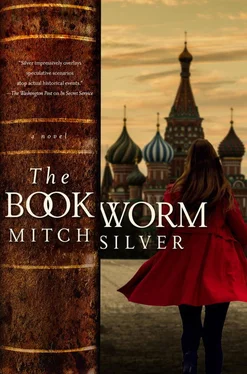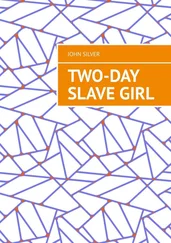Then that blessed molar made its presence known and they had to call in a dentist from Villefranche. Peter was gallant enough to stay with his wife and Ian was sent over to us in their stead. Ah well, the best-laid plans…
Because Dietrich’s new citizenship was the pretext for the party, Willie and I commandeered the Americans who had taken the villa on the other side for the month: Joe Kennedy and his two grown sons attended while the Ambassador’s wife was back with their younger children in America.
Lara lifted the lever that was playing the cylinder. This couldn’t be right, could it? Dietrich? Maugham? The Kennedys? What did any of it have to do with a long-lost book?
Lara looked around. Through the glass of the Listening Room door she could see one or two scholarly types, nearly buried behind the piles of books they were using for their research. She let out a huge sigh. What the hell—she was all the way out here already. So she lifted the lever and put it back on the cylinder.
The evening was a strange one, even for me—one woman and seven men, Marlene having in tow the writer Erich Maria Remarque, an inconvenience as they were both married to other people back in Germany.
Over dinner, I found the eldest Kennedy son, Joe Jr., to be as smart as he was strapping and obviously his father’s favorite. Sorry to say, he was killed when his plane went down on a training run over Suffolk last month. The younger boy, John, slightly built and somewhat unwell-looking with his suit hanging off him, was “doing Europe” before beginning his last year at university. John, who insisted everyone call him Jack, was as taken with our guest of honor as his father, who never took his eyes off her as she regaled the table with stories of the well-known and the well-off.
The topper came over coffee, when Marlene produced from her evening bag a telegram she’d received that afternoon, forwarded from Berlin by the German consul in Nice, or was it Monte? She passed it around for our viewing and Maugham prevailed upon Ian as the “new boy” to translate it aloud for the Kennedys and me, lest Marlene have to do all the work.
“My Dear Blue Angel, Your fleeting presence in Europe compels me to request the pleasure of your company at the Berghof at a time of convenience to you. I again implore you to return to the country of your roots, for your artistry is all that is lacking for the new Reich to be gloriously complete. I await your reply. Your most ardent admirer, A.H.” This last bit he did looking straight into Dietrich’s eyes, as if the words were coming from Ian Fleming and not Adolf Hitler, a nice bit of stagecraft if I say so myself.
Marlene smiled. But all she said was, “This is the third cable from Hitler this year. What he refuses to understand is that he is the reason I’m not coming back.
“You see, he considers me his good luck charm. Years ago he went to a movie theatre in Munich and saw Die Blaue Engel. The following day the National Socialists won ninety-five new seats in the Reichstag. Then, when Dishonoured was playing in Berlin two years later, they won another one hundred twenty-three.
“As luck would have it, nothing of mine was available next time around and he watched a Bette Davis picture instead, with subtitles. For the first time, they lost votes.” She laughed and lit a cigarette. “So now I’m his ‘Blue Angel.’”
She took a pull on her cigarette and exhaled. “At least Roosevelt doesn’t think I’m a human rabbit’s foot.” Marlene was putting the telegram back in her evening bag when she said, “He had an astrologer, did you know that?” Sitting next to me, Maugham rose to the bait. “I thought that sort of thing went out with Louis Quinze.”
She said, “Apparently not. This one called himself a clairvoyant.”
Joe Jr.’s laugh must have sounded like disbelief, for her companion, Remarque, leapt to her defense. “No, it’s true. His name was Hanussen. When they lost those ‘Bette Davis’ seats in ’32, the Bavarian corporal was worried and he called the man in for a private reading.”
Marlene interrupted. “Let me tell it, Ricky.” She got up so she could pantomime the action. “So this Hanussen comes to Hitler’s place and seats him in the exact middle of the room. The man examines his hands, counts the bumps on his head or some such rot and sinks into a mystical trance. Then he declares, ‘I see victory for you. It cannot be stopped.’ Can you imagine?”
Remarque added, “And here’s the best part. The faker was a Jew! Erik Jan Hanussen began life in Vienna as Hermann Steinschneider. Everybody knew he was Jewish except the Führer.”
I thought what Jack Kennedy said next was just to prove he was listening. “So what became of this astrologer?”
Dietrich told him. “After the Nacht der langen Messer , they found his body in a field on the outskirts of Berlin. You see, he was the one man who had seen the Führer worried. They couldn’t have that.”
As Maugham and I were getting ready for bed we talked over the evening, and I don’t recall either of us mentioning the bit about the clairvoyant. It was only when I again saw the younger Kennedy boy that the episode took on a different aspect.
Chapter 14

The wax cylinder had come to the end and was making a little hiccup every time it revolved past the machine’s lever. Lara stopped it, grateful for the chance to get up and walk around. She found it tiring to take notes, especially when you don’t know what you’re listening for. Besides, was any of it real, or merely a long-dead playwright’s imaginings?
She performed a few knee bends and back twists, and flapped her hands in the air to get the kinks out and the blood circulating. Then she reached down for the second recording, wondering not just what Coward would say next, but what any of it had to do with the origins of the Great Patriotic War.
This is Dictaphone cylinder number two. I saw Jack Kennedy again by chance (or so I thought) the next June at a club in Harlem, New York, the kind of place where they keep bringing out extra tables and chairs for the crowd until everyone is sitting in the laps of everyone else.
I had just taken French leave from running our propaganda office on the Continent, having concluded that, if his Majesty’s Government aimed to bore the Germans to death, we didn’t have the time. I was working directly for Winston now, attempting to charm the Americans with song and dance into supporting our cause despite a little thing called Dunkirk.
My last night in the States, I went to see Marlene perform after hours with Cab Calloway’s band, and visit backstage after the show before returning home to sing for the troops. Earlier in the day she had made a personal appearance at Radio City, where Destry Rides Again was doing wonderful business. Now, fourteen hours later, she was still fresh as a daisy, warbling her tunes through the blue haze of a thousand chain-smoked cigarettes, when I looked around and saw the manager, Patrice, carrying a chair over his head and leading someone in evening clothes through the throng.
Patrice shoved the chair down in the two inches next to mine and a tuxedoed Jack Kennedy was saying, “May I?” even as he was peeling off bills for the tip.
Capping an evening that must have included some formal affair, he appeared to be over the jaundice or whatever it was the previous summer. We sat together, entranced by La Dietrich. I didn’t know then that Jack and Marlene were already lovers… she hadn’t breathed a word.
In her dressing room afterward, she introduced me to Calloway, the man with the largest set of incisors I have ever seen. Eventually I tried to take my leave, explaining I was sailing in the morning, but Jack insisted I join them for a nightcap in his hotel room. “I have a car outside.” Don’t they always.
Читать дальше













